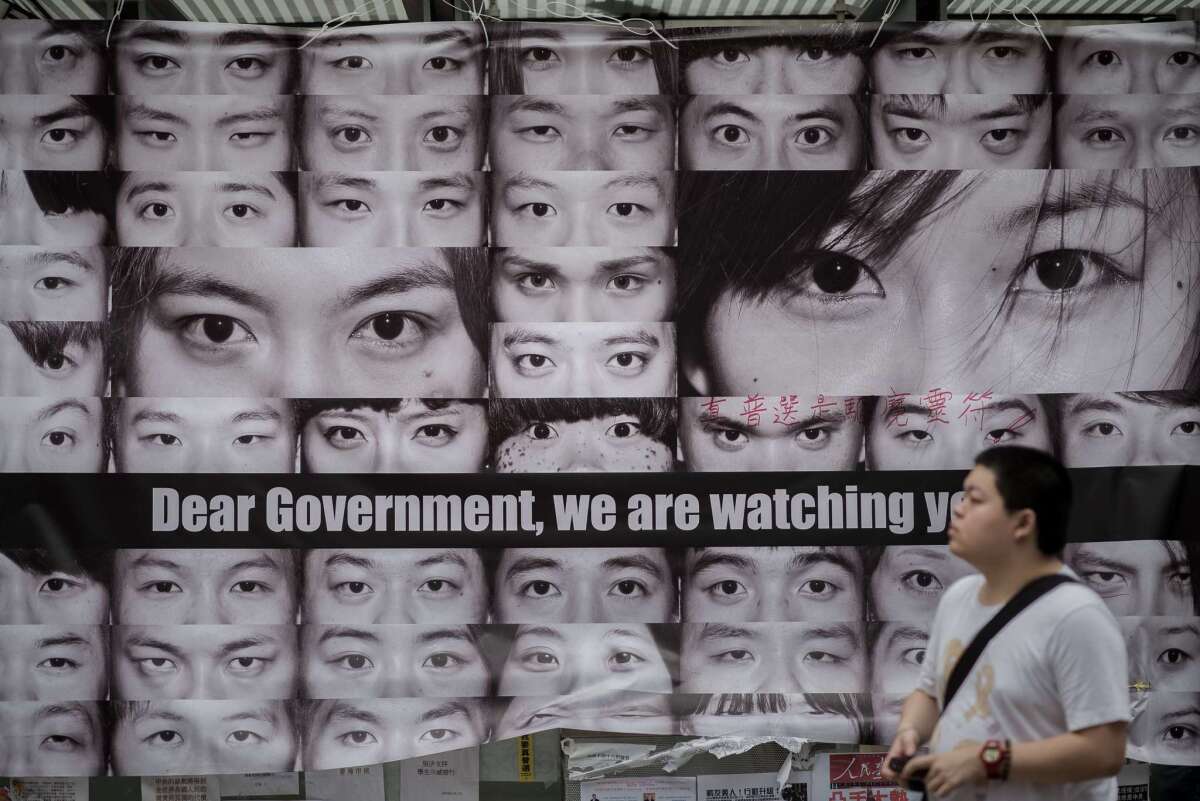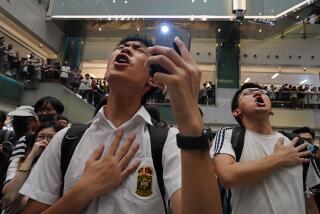Hong Kong court says police can remove protesters

Reporting from Hong Kong â Hong Kongâs pro-democracy demonstrators could be forced to leave the streets or risk arrest as early as Wednesday after the territoryâs high court ruled that police could start removing barricades and protesters from occupied zones.
The injunctions apply specifically to protesters in the Mong Kok district and the area around one skyscraper in the Admiralty area, near government headquarters. The courtâs ruling, issued Monday but only made public on Tuesday, enhanced three interim restraining orders issued on behalf of the owner of the skyscraper, two taxi driver groups and a minibus management company.
The plaintiffs told the court that the blockades of the streets had hurt their businesses. Police will be authorized to arrest and remove demonstrators who interfere with the plaintiffsâ work of clearing the sites.
Meanwhile, Carrie Lam, Hong Kongâs No. 2 official, on Tuesday called on the protesters to leave the streets, saying that police are ready to help enforce the court order. Several Hong Kong media outlets speculated that the government was planning to clear the protesting sites after the APEC summit in Beijing ends and foreign leaders depart Wednesday.
Asked about the Hong Kong protests, President Obama in Beijing offered some carefully calibrated comments. âObviously, the situation between China and Hong Kong is historically complicated and is in the process of transition,â he said.
âOur primary message has been to make sure violence is avoided. We donât expect China to follow an American model in every instance. But weâre going to continue to have concerns about human rights.â
Obama was meeting with Chinese President Xi Jinping on Tuesday evening and was to deliver remarks with him Wednesday morning before flying to Myanmar.
Protesters in Hong Kong, a former British territory that returned to Chinese rule in 1997 under a framework known as âone country, two systems,â took to the streets in late September after the standing committee of Chinaâs National Peopleâs Congress in August issued a framework for Hong Kongâs 2017 chief executive election. Opponents say the framework imposes unacceptable restrictions on who may be approved to run as a candidate.
A two-hour dialogue between protest leaders and five Hong Kong government officials last month yielded little common ground. Though several rounds of dialogue were promised, Lam seemed to close the door Tuesday on the idea of further talks.
She accused the Hong Kong Federation of Students, a leading protest group, of toughening its stance after the first round of dialogue by insisting on the withdrawal of the August decision, and by calling for direct talks with the central government.
âStudent leaders didnât show sincerity after the first talks,â she said. âThereâs no room for negotiation for the time being.â
Lau Siu-kai, a professor at the Chinese University of Hong Kong who served as an advisor on Hong Kong affairs to the central government during the 1997 handover from Britain and who recently joined a new think tank founded by former Hong Kong chief executive Tung Chee-hwa, said the students have lost their momentum in negotiating with the government.
âThe best scenario would have been that the students occupied the streets for a couple days, and then leave the occupied sites,â said Lau. âYou have your demands heard and at the same time prove that the government cannot disperse your power, then you enter a long-time, well-organized and strategic struggle for democracy.â
Although the number of protesters has dropped significantly from the peak in early October, Lau said will not be easy to clear the protest sites by force. More people may come out to show their support, he said, though he warned that time is not on the protestersâ side.
âThe longer the protests last, the more citizens feel it should come to an end, thatâs when the police can successfully clear the sites,â he said.
Hui is a special correspondent.
More to Read
Sign up for Essential California
The most important California stories and recommendations in your inbox every morning.
You may occasionally receive promotional content from the Los Angeles Times.










